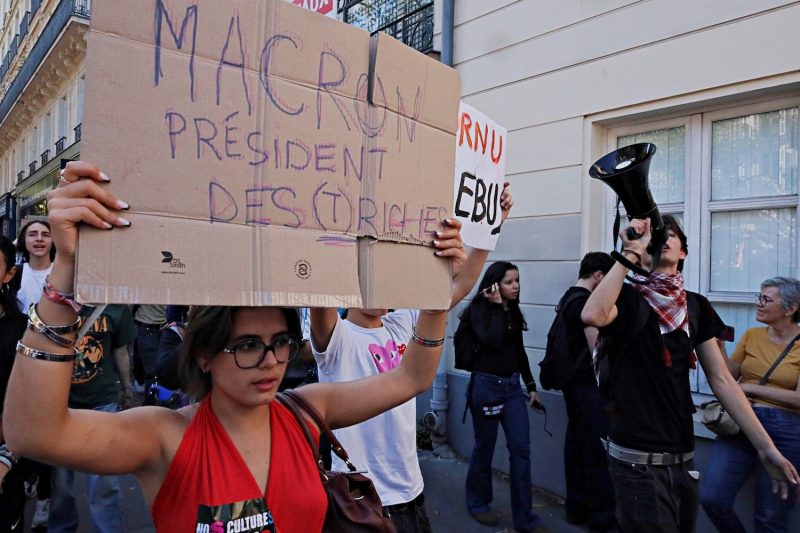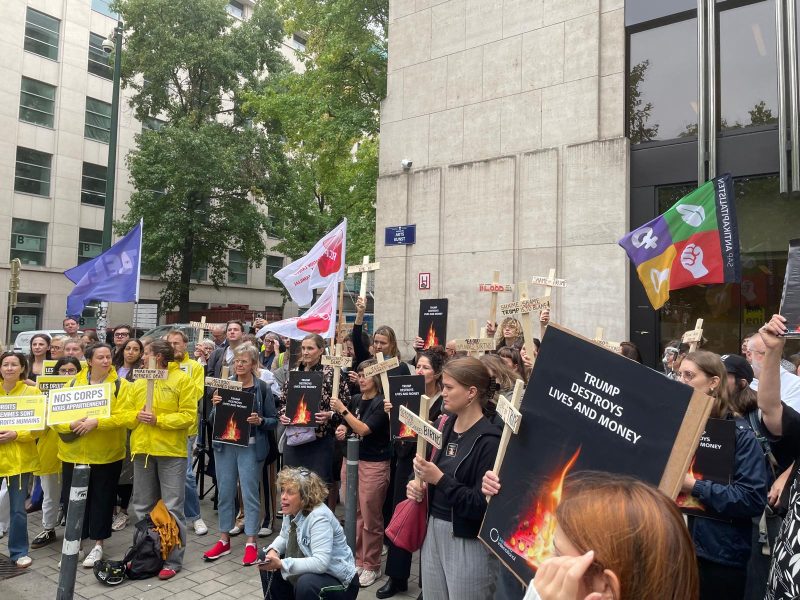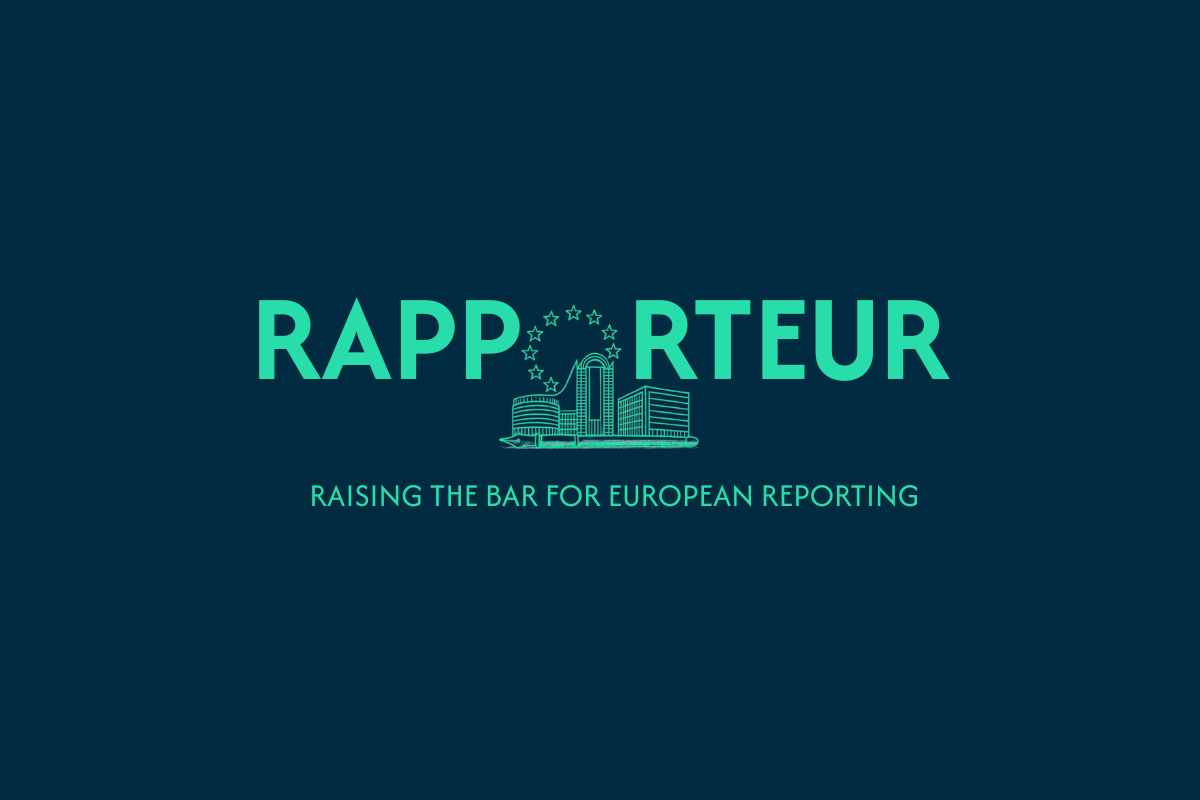Welcome to Rapporteur, the newsletter formerly known as The Capitals. I’m Nicoletta Ionta, joined by Eddy Wax in Brussels. Each day we’ll bring you up to speed on the stories shaping the EU and European politics.
Need-to-knows:
Russia: Ambassadors meet today on the bloc’s 19th package of sanctions
France: Protesters clash with police in nationwide anti-austerity strikes, with 181 arrested
UN: EU countries tentatively agree to a vague 2035 climate pledge
But first, a reality check on the transatlantic trade deal…
A message from the Euractiv Jobsite
A new and improved Jobsite!
Trusted by the Brussels bubble for over a decade, the Euractiv Jobsite is the go-to platform for careers in EU affairs. Whether you’re recruiting top talent or looking for your next opportunity, we connect institutions, NGOs, think tanks, consultancies and more across the EU job market.
In the capital
Parliamentarians are nostalgic, or so the argument goes inside the Berlaymont office of Maroš Šefčovič, Brussels’ perennial problem solver and the man who stitched together the EU-US trade pact.
The resistance, Šefčovič believes, reflects “a very strong kind of longing for the world to go where it was before April 2,” Donald Trump’s so-called Liberation Day, when Washington slapped sweeping reciprocal tariffs on its trade partners.
That era, he insists, is over. “I don’t believe that this world will come back. We are now simply in different geo-economics,” the EU trade chief told Rapporteur’s Eddy Wax and Thomas Møller-Nielsen, after clocking up countless hours briefing MEPs over the summer.
Still, not everyone is buying it.
Some groups have already promised to amend the deal, and when Šefčovič faced Parliament in Strasbourg last week, the criticism stung. “I was not surprised. But it was tough.” He also said that Brussels wants to expand on the deal by teaming up with Washington on protections for steel imports as soon as October.
The backlash, however, is real. Two concurrent no-confidence motions have been tabled against Ursula von der Leyen’s team – one from the far left, one from the far right. Even beyond those camps, discomfort runs deep.
“Our position is clear: we want to amend the agreement,” said S&D leader Iratxe García. When I pressed her on if she would block it, she hedged: “We are against, but we want to be constructive.”
Šefčovič, for his part, is unmoved. “We cannot dilute the deal we agreed. We have to be a serious partner in this relationship.”
Yes, amendments will come, he conceded. But he waved away talk of inter-institutional crisis, which he knows too well after having been in the EU for two decades. “Crisis is a very strong word. To be honest, we are quite used to this.”
And, with a trace of optimism: “None of the amendments, I think, that have a chance to succeed would go against the deal or would be diluting the deal.”
Whether that optimism holds is unclear. For Parliament, the word of the moment is “improving” – by tweaking proposals to scrap tariffs on industrial and agricultural products and by extending the lobster agreement, trade committee chair Bernd Lange told Thomas.
What that means in practice is still an open question.
As Europe scrambles to hedge against US protectionism by broadening trade ties, Šefčovič played down hopes for a swift pact with India here.
White smoke on the 19th package?
EU ambassadors meet today to hash out the bloc’s 19th sanctions package against Russia, after delays amid US pressure on Europe to take a tougher role in ending the war in Ukraine.
The Commission wants to accelerate Europe’s break from Russian fossil fuels, with one official telling Euractiv that sanctions are the way to do it. Gas could be next, two EU diplomats suggested.
The package is also expected to tighten controls on sanctions circumvention, increase pressure on Russian banks and energy firms, blacklist additional shadow fleet vessels, and explore export restrictions to third countries. Tougher rules on issuing tourist visas to Russians may also be on the table.
Europe stalls on 2035 emissions goal
After a nine-hour conclave of environment ministers in Brussels, the EU will head to New York next week with only a vague climate pledge to show at the UN General Assembly, Nikolaus J. Kurmayer reports.
Member states agreed on a “statement of intent” promising a future UN target of 62.25-72.5% below 1990 levels by COP30 in November, following fraught talks between deeply divided governments. Brussels has missed both its February and September deadlines and faces a final chance at agreement when leaders meet in late October.
Once-ambitious countries like France have shifted into stalling. Meanwhile, the UK has submitted an 81% target for 2035. It remains to be seen whether the EU can rally around a similar level of ambition.
Merz’s Madrid debut meets a Gaza divide
Pedro Sánchez hosted Friedrich Merz in Madrid for his first official visit since taking office as chancellor in May, but their show of unity was clouded by sharp divides over the war in Gaza, Inés Fernández-Pontes and Jeremias Lin report.
Pressed on why Spain calls it genocide while Germany does not, Sánchez said simply: “Chancellor Merz has explained the German position. I have explained the Spanish position.”
Sánchez welcomed the Commission’s new sanctions on Israel as long overdue, while Merz, citing debates in parliament and the coalition, said Germany’s position would likely emerge at the Informal Council on 1 October in Copenhagen.
MEPs push resolution after uproar over Kirk
More than 80 lawmakers, ranging from the centre-right to the far-right, have backed a resolution condemning the murders of Trump ally Charlie Kirk, a conservative activist, and Ukrainian refugee Iryna Zarutska, who had been living in the US.
The move follows last week’s uproar in Strasbourg, when Parliament refused to hold a minute of silence in Kirk’s memory – a decision that triggered a bitter debate and saw right-wing lawmakers pounding their desks in protest. The resolution is now expected to be added to the agenda for the next plenary session in October.
The Commission’s vanishing AI pilots
Ursula von der Leyen appeared to misspeak this week when she announced that she would sign “pilot projects” linked to the EU’s planned AI Gigafactories, my colleague Maximilian Henning reports. The reference was later scrubbed from the official transcript of her speech.
It was clear what “pilots” she had in mind, as the Commission has not floated any plan to test projects before building the factories themselves. A Commission spokesperson later clarified that the agreements to be signed today concern the EU’s planned green transport corridors, not AI.
Jewels, jail, and Qatargate
A string of European lawmakers, past and present, have come under judicial scrutiny this week. Here’s our judiciary recap:
Rachida Dati – former MEP (EPP), minister, and current frontrunner in the Paris mayoral race – faces a fresh investigation in France for allegedly failing to declare luxury jewellery. She denies any wrongdoing.
Ilaria Salis (The Left) may soon lose the parliamentary immunity shielding her from a possible return to a Hungarian prison. In response to her plea to maintain immunity ahead of a key vote, a Hungarian government spokesperson pointed to the coordinates of a facility where inmates manufacture barbed wire.
Elisabetta Gualmini and Alessandra Moretti (S&D) are still awaiting a decision on whether their immunity will be lifted in relation to the Qatargate probe. Both deny involvement, and although their case will be debated next week, the Socialist group has already reinstated them.
The capitals
LONDON 🇬🇧
At a press conference at Chequers with PM Keir Starmer, Trump criticised Vladimir Putin for prolonging the war in Ukraine, saying he had expected a swift resolution because of their past relationship. “I thought this would be one of the easiest wars to resolve,” the US president said, “but he has let me down.” Starmer later urged Western leaders to increase pressure on Russia to agree to a lasting peace.
ROME 🇮🇹
Italy’s lower house approved a constitutional reform bill separating the careers of judges and prosecutors, a flagship measure for Forza Italia, the coalition partner of PM Giorgia Meloni. Because the measure fell short of the required two-thirds majority, it will now advance to a confirmatory referendum expected next spring, following a final Senate vote later this year.
MADRID 🇪🇸
Spain’s top prosecutor, Álvaro García Ortiz, on Thursday ordered the creation of a special task force to investigate alleged violations of international human rights law in Gaza. The team of senior prosecutors will examine whether Israeli military actions could amount to breaches of international law under Spain’s criminal code, the Public Prosecutor’s Office said.
WARSAW 🇵🇱
After reports that Chinese Foreign Minister Wang Yi had pledged support for Poland’s entry into the G20 during a trip to this capital, a ministry spokesperson said Beijing is “open” to talks on expanding the group. Diplomatic sources cited by the Polish Press Agency said Wang gave a “firm promise” to Radosław Sikorski, Poland’s deputy prime minister and foreign minister. “China values Poland’s position and influence,” the spokesperson said.
LISBON 🇵🇹
Portugal signed a landmark €1.34 billion financing deal with the European Investment Bank on Thursday to expand affordable housing, in a move officials cast as central to both social stability and economic growth. The plan, covering 12,000 middle-class rental homes, extends EU-backed housing targets until 2030.
BRATISLAVA 🇸🇰
Slovak Foreign Minister Juraj Blanár on Thursday said that his party has not yet received formal notice of expulsion from the Party of European Socialists but would respond appropriately if it does. “You should ask Euractiv where they got this information. We have not received any official communication yet,” Blanár said on Braňo Závodský naživo, referring to Rapporteur’s exclusive report.
Also on Euractiv
‘Tax the rich’: Hundreds of thousands in France protest austerity
PARIS – Hundreds of thousands protested austerity in France on Thursday, as unions hailed a…
3 minutes

France erupted in protest again on Thursday, with hundreds of thousands flooding city streets to denounce austerity and demand that the wealthy shoulder more of the burden.
At Paris’s Place de la Bastille, banners read “tax the rich” as PM Sébastien Lecornu, barely a week into the job, faced his first major test. From nurses lamenting chronic understaffing to teachers calling for Macron’s resignation, the anger was palpable – and by evening, scuffles with riot police underscored the stakes.
Protestors try to save Belgium’s $10 million stockpile of USAID contraceptives
“Shame, shame, Trump is to blame”, protestors cried on Thursday in front of the US…
3 minutes

In Brussels, the chants echoed: “Shame, shame, Trump is to blame.”
Outside the US embassy, activists and ordinary citizens gathered to stop the destruction of some $10 million worth of contraceptives sitting in a Belgian warehouse.
The supplies, advocates say, could prevent more than 360,000 unintended pregnancies. For them, the stockpile has become a symbol of something larger: a fight against Trump’s conservative agenda and for reproductive rights.
Agenda
➡ Copenhagen: Eurogroup and informal ECOFIN meeting
➡ Brussels: Šefčovič meets a delegation from the European Steel Association, Eurofer, led by its president Henrik Adam
➡ Porto: Costa attends the Social Forum, meets PM Montenegro
Contributors: Thomas Moller-Nielsen, Nikolaus J. Kurmayer, Sofia Sanchez Manzanaro, Elisa Braun, Magnus Lund Nielsen, Laurent Geslin, Inés Fernándes-Pontes, Jeremias Lin, Maximilian Henning, Alessia Peretti, Aleksandra Krzysztoszek, Sofia Branco
Editors: Christina Zhao, Sofia Mandilara
